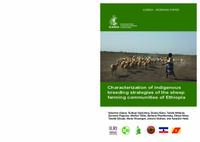Characterization of indigenous breeding strategies of the sheep farming communities of Ethiopia

Authors:
This working paper synthesizes and analyzes the characteristics of the indigenous sheep production and breeding strategies and practices of four sheep farming communities located in pastoral (Amibara), sub-alpine sheep-barley (Menz), perennial crop-livestock (Bonga), and cereal-livestock (Horro) production systems. The paper also provides a model framework for characterizing the indigenous sheep production and breeding practices of traditional sheep producers in Ethiopia as a basis for designing suitable community-based breeding programs. Sections 1-3 of the paper present introduction to, objectives and study framework of the ICARDA-ILRI-BOKU research project.
Chapters 4 and 5 give highlights, respectively, on sheep breeding strategies and the basis for designing community-based breeding programs in Ethiopia. Section 6.1 analyses indigenous sheep production and breeding strategies and practices of sheep farming communities. The paper closes with a synthesis of approaches to the design of community-based breeding programs including definition of breeding objectives, designing, optimizing and implementing community-based breeding programs in section 6.2.
